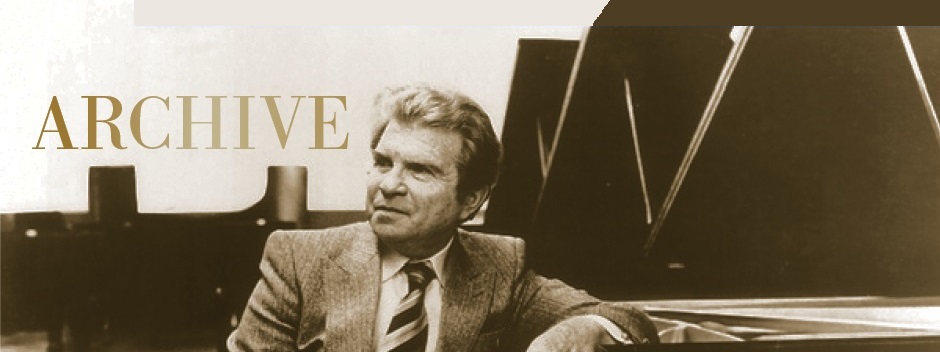Berta Reingbald came from a family of famous architects, and studied with E. Chernetskaya-Geshelin (a student of Vasiliy Safanov). By the time Gilels met Reingbald she already had a reputation of not only being a highly cultured and broadly educated person, but also as an eminent piano pedagogue: she had taught important musicians including B. Marantz, T. Goldfarb and B. Kozel. Her experience in working with highly talented students lead Reingbald to recognize immediately that Gilels possessed a talent that was in a completely different league, never before witnessed. She subsequently began to pay close attention to his development.
It fell upon Reingbald to work with Gilels at a hard time in his development: the lively fourteen year old with wide-ranging interests sometimes would swap practising for spending time with friends. Berta Reingbald overcame these difficulties with great patience, sometimes even working with him for several hours every day. She was interested in all aspects of his life and adapted to his strong character. However, the most important thing that she did for Gilels was to broaden his cultural knowledge. Reingbald introduced him to a lot of music that he had previously not known about, she introduced him to Odessa’s musicians and music-lovers, and awoke in him an inquisitive interest to the Arts.
Besides his musical talent Gilels had a capacity for humanities. Aged thirteen and a half he had already entered the conservatory on account of finishing his general schooling (and although his relationship with mathematics, akin to many musicians, was tense, history and literature came to him very easily). Because of the mentoring of Reingbald, Gilels was able to enrich his astounding musical intuition with a more complete knowledge and understanding of the Arts. The work at perfecting his pianism was unending, and if at the age of thirteen he had achieved that which many virtuosi may only dream of attaining at the end of their studies, in the next step of his development between the age of fourteen and sixteen, Gilels acquired such pianistic traits that were only given to a select few in the whole history of piano interpretation.
It did not take long for the fruits of Reingbald’s work with Gilels to materialize. At the start of the 1930s Odessa was often visited by important touring musicians. Gilels was shown to Alexander Borovsky and Artur Rubinstein. Without conferring both musicians described the impact of Gilels’ playing as ‘astounding,’ and Artur Rubinstein went on to predict that if Gilels were to come to America he would eclipse everyone including Rubinstein himself.
Like Tkach, Reingbald protected her student from excessive concert performances. Yet, she did organize for him to play in the All-Ukrainian Competition despite Gilels being below the age limit to participate. The jury was impressed by his performance and they presented him a scholarship that freed him from the need to play concerts to earn money for his living expenses. The main goal of Berta Reingbald however, was the participation of Gilels in the First All-Union Competition of Performers which was announced to take place in 1933 in Moscow.


